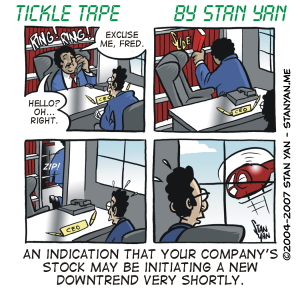Stan and John have been following a stock and trying to anticipate the pivot point. Stan declares, “After looking at the troughs and moving averages over the past 30 periods, the facts indicate that the pivot will be exactly at 50. I’m positive; it must be right at 50.” John replies, “Exactly 50? Maybe around 50, but I wouldn’t be that precise.” These two traders have very different personality styles when looking at information and drawing conclusions. Stan wants to just focus on objective facts. He is a “tough-minded” decision-maker. John, in contrast, is more intuitive. He sees so-called “facts” as merely subjective interpretations. Like many seasoned traders, John relies on an abstract feeling he has for the markets and trusts his intuition. He’s an intuitive trader.
 How do you observe the world and gather information about it? Do you just want the facts and the specific details and none of that “touchy-feely” stuff? Or are you more intuitive? You don’t believe in facts. You think the reality is subjective, merely an artificial construction that differs from person to person. You prefer to think in theoretical and abstract terms. Perhaps you are a little of both. Philosophers, such as William James and Carl Jung, have relished demarcating various “types” of people. “Types” are ideals that don’t really exist in a pure form. They are merely loose categories we use to make sense of the world.
How do you observe the world and gather information about it? Do you just want the facts and the specific details and none of that “touchy-feely” stuff? Or are you more intuitive? You don’t believe in facts. You think the reality is subjective, merely an artificial construction that differs from person to person. You prefer to think in theoretical and abstract terms. Perhaps you are a little of both. Philosophers, such as William James and Carl Jung, have relished demarcating various “types” of people. “Types” are ideals that don’t really exist in a pure form. They are merely loose categories we use to make sense of the world.
They reduce information overload but often distort. Despite the inaccuracy of placing people in categories, it does often seem that some people fit more into one “type” than another. Take, for example, what James called the “Rational” versus the “Empiricist,” or what Jung called the “Intuitive” versus the “Sensor.” Sensor types prefer cold hard facts and see the world as rational, predictable, and orderly. Intuitive types are more fanciful, and see the world as random, theoretical, and conceptual. This typology may also apply to the way people approach trading. Which type of trader are you?
A trader who is a sensor, for example, may want to know the specific price level where resistance begins. He or she would prefer to follow a specific set of rules to identify precisely where resistance begins. An intuitive trader, in contrast, merely views the “rules” to identify resistance as just guidelines, which may work sometimes but not always. For example, perhaps resistance will be a round number or a previous peak or trough, perhaps it will not. No one knows for sure; such guidelines are just possibilities, not hard and fast rules.
Sensors look at market concepts literally, believing they are true-life entities, rather than just abstract concepts. An intuitive trader looks at the markets in a figurative sense. All signals and indicators are subjective in the end, maybe a little inaccurate, and are a mere approximation of reality. There’s a good chance they will be wrong and that’s all right.
When it comes to the markets, it’s generally advantageous to be an intuitive trader. Reading the charts and getting a feel for the markets is subjective. Trading decisions are merely based on educated guesses. It isn’t exact, but mushy, random, unpredictable, and conceptual. It’s not linear, the matter of fact, and predictable. Expert traders and trading coaches have long noted that sensors have difficulty learning to trade. They want to find all the specific facts and unfailing rules that can be used to forecast the markets. They tend to think that if the “right” set of signals can be discovered, they can make big profits. I
t would be nice if it were that simple, and if it were, there would be a bunch of smart people with Ph.D.s in economics and other fields who would be billionaires, but there aren’t. Why? Because the markets are so complex and chaotic that it takes intuition, hunches, and a kind of creative and artful mastery to win consistently. The logical analysis of facts and figures can only go so far when you are trying to trade the markets, which have inaccurate figures and are largely inexact. So if you are a “natural” intuitive type, you’ve got a head start. And if you are a sensor, try to nurture your more intuitive side. Become an intuitive trader, and you’ll see your profits grow.

